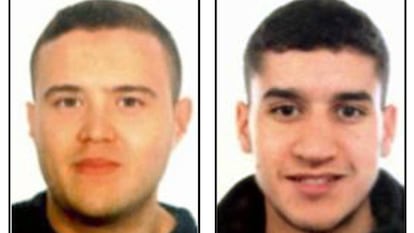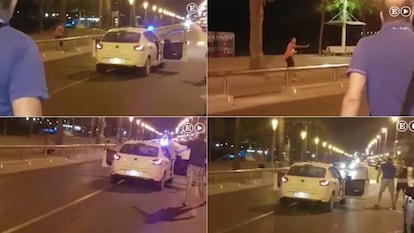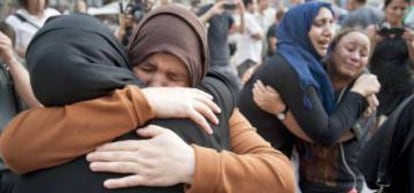Why did “well-integrated” Moroccans carry out Barcelona terror attack?
Local people come to terms with radicalization of young men who carried out killings in Catalonia last week

Shocked residents in Ripoll are now trying to understand how a group of young people seemingly so well-integrated into the local community and who spoke perfect Catalan could have been radicalized.
In Ripoll, the most common theory is that the suspected terrorists were “brainwashed by someone”
One local, after a long conversation with two elderly Muslim men, said: “They were good people. Good people.”
On Thursday, shortly after the van attack on Barcelona’s central La Rambla boulevard which left 13 dead and over 130 injured, an employee with Ripoll town hall, Núria Perpiñá, was with the sister of Moussa Oukabir, at that stage one of the chief suspects in the attack. Perpiñá has known the family with five children for many years. Oukabir’s sister couldn’t understand how her brother had carried out the attack. “I mean, I am Catalan,” she told Perpiñá.
Like Perpiñá, nobody in the town knows when Moussa and the other young members of the terrorist cell drifted toward the radicalism that would see them perpetrate the worst terrorist attack in Spain since the 2004 train bombings in Madrid in which 193 people were killed and 1,700 injured.
In Ripoll there is widespread surprise that a “group of friends” who were apparently well integrated in the community – they had an indoor soccer team and were friendly with other young people in town – had became terrorists.
Ripoll is where most of the people suspected of involvement in the Barcelona terror attack came from. At 9.15am on Thursday, Yolanda, one of their friends, said goodbye for the last time to three of them. They got in a white Fiat van and left town. The vehicle had been parked behind a building where the Oukabirs had stayed in the days beforehand, according to neighbors.
The roughly 500 Muslims who live in Ripoll – around 5% of the population – are distributed throughout the town. Perpiñá is a neighbor of the family of Younes Abouyaaqoub, the man suspected of driving the van during the Barcelona terror attack. People who know the 22-year-old say he is “incapable of leading anything.”
One of the other detainees – Salh El Karib, the owner of an internet kiosk – lives in the same apartment building as a journalist with a Catalan news outlet. El Karib, 34, has lived in Ripoll for the last four years. He has a wife and a two-year-old daughter.
The process of radicalization of young Muslims is complex. But in Ripoll the most common theory is that they were “brainwashed by someone.”
“Someone put strange ideas in their heads,” said a teacher who has worked with several of the men involved in the massacre. Those men had attended the Punt Òmnia center for people at risk of social exclusion – one of 124 such centers around Catalonia run by the regional government. That is where Moussa Oukabir, among others, had a space to do his homework, perfect his Catalan and get assistance. In the early hours of Friday morning, Moussa participated in the attack in Cambrils in which one person was killed and five others were injured. He was shot dead by police. He was 17.

Investigators are increasingly certain that an external influence helped bring about the change in personality of the terrorists who carried out the Catalonia attacks. Catalan regional police are now investigating whether Abdelbaki Es Satty, the local imam, played a key part in radicalizing the youths.
His apartment was searched for four hours on Saturday. Officers were looking for documents and other evidence, as well as DNA samples. According to sources within the investigation, Abdelbaki was killed in an explosion on Wednesday in a house in the Catalan town of Alcanar which was being used as a base of operations by the terrorist cell, but this not been officially confirmed by police.
Abdelbaki Es Satty arrived in Ripoll around two years ago and served as the imam for the Annour community, one of two mosques in the town.
Religious youngsters
The young men from Ripoll suspected of carrying out the attacks in Barcelona and Cambrils have been described as being dedicated to their religion. “Mohamed Hychami was the most pious employee at Comforsa [the metal stampings firm where he worked]. He was very polite, and prayed a lot, but when you spoke to him about religion he got really angry,” said one coworker who asked not to be named. He was so serious about his job that when his boss asked him a couple of weeks ago to delay his holidays and help fill an order, he said yes. Mohamed Houli, injured in the explosion in Alcanar, refused to work, saying he was in Morocco to visit his sick grandmother. However, a coworker said this was not true and Houli had remained in town.
Whoever radicalized them, the cell members quickly become ready and able to act
The Hychami brothers – Mohamed and Omar, both killed by police in Cambrils – were described as exemplary students. “They never raised their voices,” said Perpiñá, who had also helped them with their studies at the Punt Òmnia center. Sometimes she had to give encouragement to Said Aallaa, 19, who was also killed by police after the Cambrils attack. “He looked like he would never hurt a fly,” said Perpiñá.
While Ripoll, in the foothills of the Pyrenees, is where the alleged terrorists behind the Barcelona attack came from, Alcanar, in the extreme south of Catalonia, is where they carried out preparations. Here, 300 kilometers from home, the group collected more than 100 propane and butane gas canisters as well as supplies of the explosive known as TAPT or the ‘Mother of Satan,’ known to be used by the terrorist organization Islamic State (ISIS). ISIS claimed responsibility for the Barcelona attack hours after it took place.

The group planned to carry out at least one large attack using bombs in Barcelona but were thwarted by the accident at the house in Alcanar on Wednesday night. That explosion forced the cell to implement a “more rudimentary” plan using vehicles, which were carried out in Barcelona and Cambrils.
The explosion in Alcanar, initially thought by regional police to be related to drug production, killed two suspected terrorists. The remains of the second suspect were found on Friday. Police sources say that second victim was Abdelbaki. This has not been officially confirmed.
Well-organized cell

The role of the religious leader in the attacks is still to be clarified – not just in terms of the radicalization of cell members but also in relation to logistics. “We can’t compromise evidence or leads, or give unreliable information,” said Mossos d’Esquadra spokesperson Albert Oliva on Saturday, adding that police had carried out nine searches in Ripoll alone that day.
Whether the members of the cell were radicalized by Abdelbaki or in another way, they quickly become ready and able to act. None had previous convictions for terrorism crimes, nor did they feature on police databases. “They are very young,” stressed Catalan regional police chief Trapero.
Most of the young men from Ripoll were born in Morocco, although some were born in Spain. There are family links among the four people already detained, the five killed by police in Cambrils and the two killed in the explosion in Alcanar.
People in Ripoll cannot understand how these integrated young men became terrorists
There are also noteworthy parallels in the stories of the two sets of brothers – the Oukabirs and the Aallaas – allegedly implicated in the attacks.
Driss Oukabir was the first suspect arrested after identity documents in his name were found by police in the van used in the Barcelona attack (papers associated with the person injured in the Alcanar explosion were also discovered in the vehicle). But Driss Oukabir maintains his innocence, saying his brother stole his papers.
There is a similarity with the case of the Aallaa brothers. Said Aallaa’s older brother Mohamed was arrested because he was the owner of the Audi in which Said was traveling with four other terror suspects during the Cambrils attack.
English version by George Mills.
Tu suscripción se está usando en otro dispositivo
¿Quieres añadir otro usuario a tu suscripción?
Si continúas leyendo en este dispositivo, no se podrá leer en el otro.
FlechaTu suscripción se está usando en otro dispositivo y solo puedes acceder a EL PAÍS desde un dispositivo a la vez.
Si quieres compartir tu cuenta, cambia tu suscripción a la modalidad Premium, así podrás añadir otro usuario. Cada uno accederá con su propia cuenta de email, lo que os permitirá personalizar vuestra experiencia en EL PAÍS.
¿Tienes una suscripción de empresa? Accede aquí para contratar más cuentas.
En el caso de no saber quién está usando tu cuenta, te recomendamos cambiar tu contraseña aquí.
Si decides continuar compartiendo tu cuenta, este mensaje se mostrará en tu dispositivo y en el de la otra persona que está usando tu cuenta de forma indefinida, afectando a tu experiencia de lectura. Puedes consultar aquí los términos y condiciones de la suscripción digital.








































